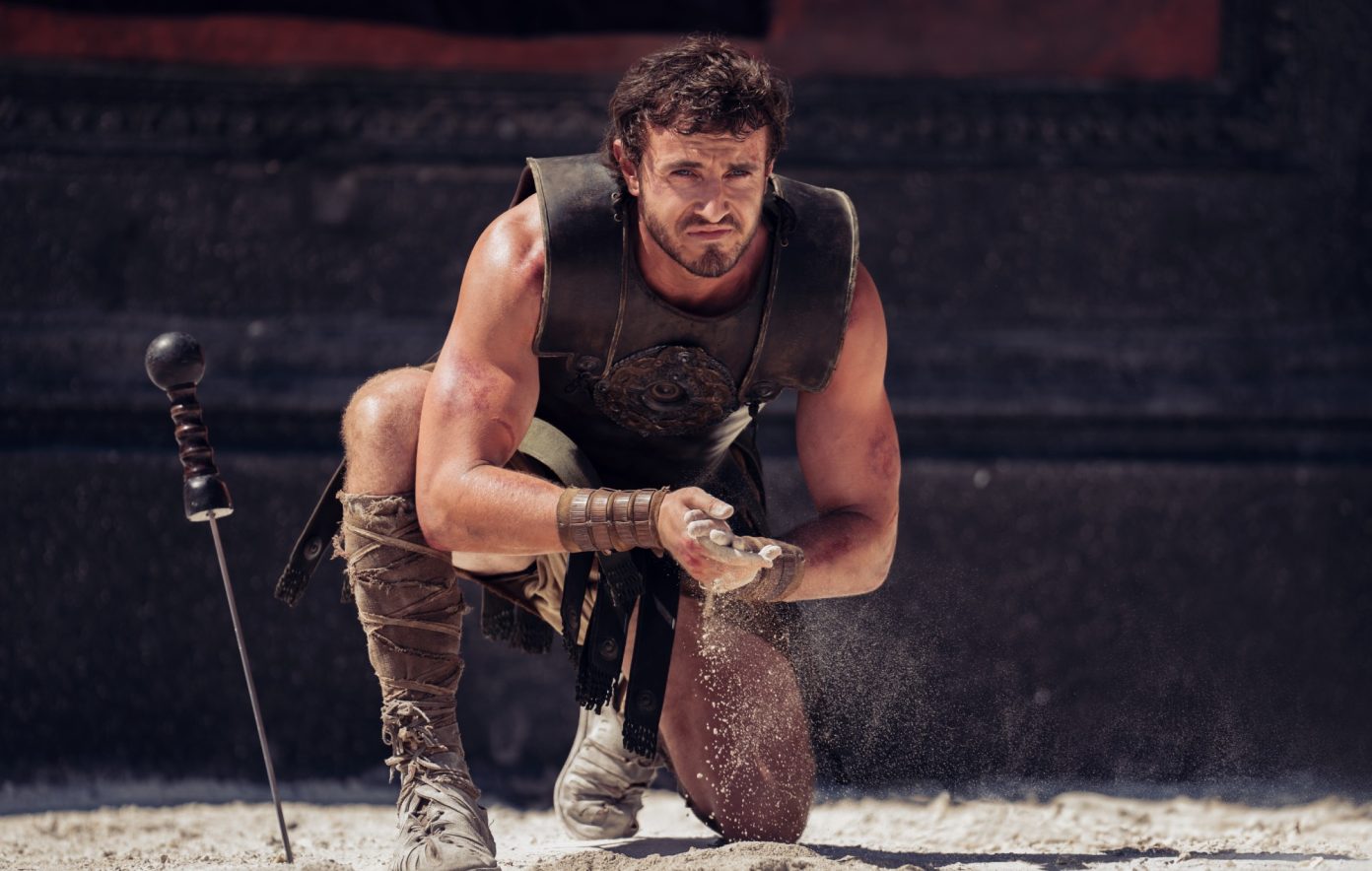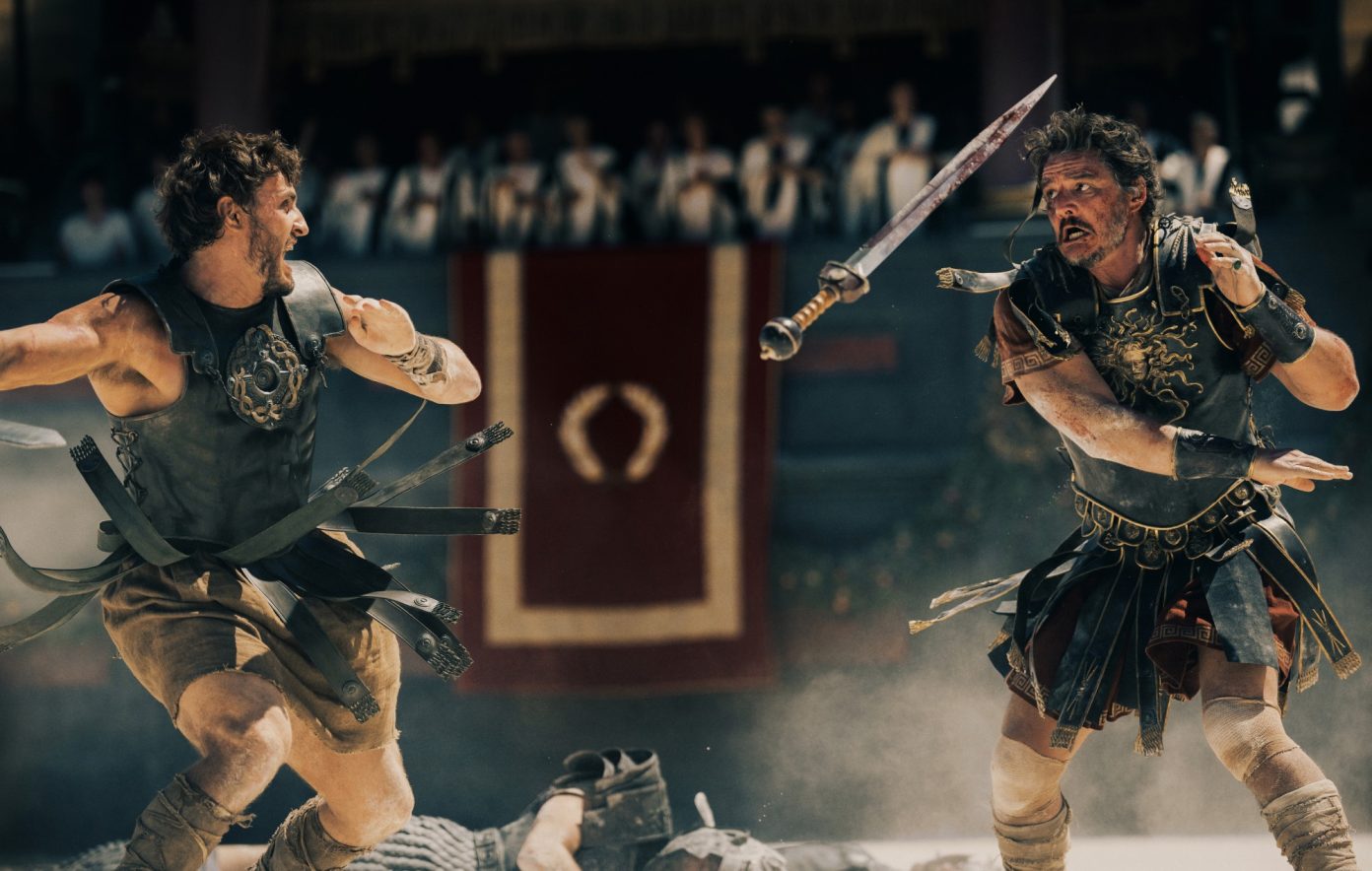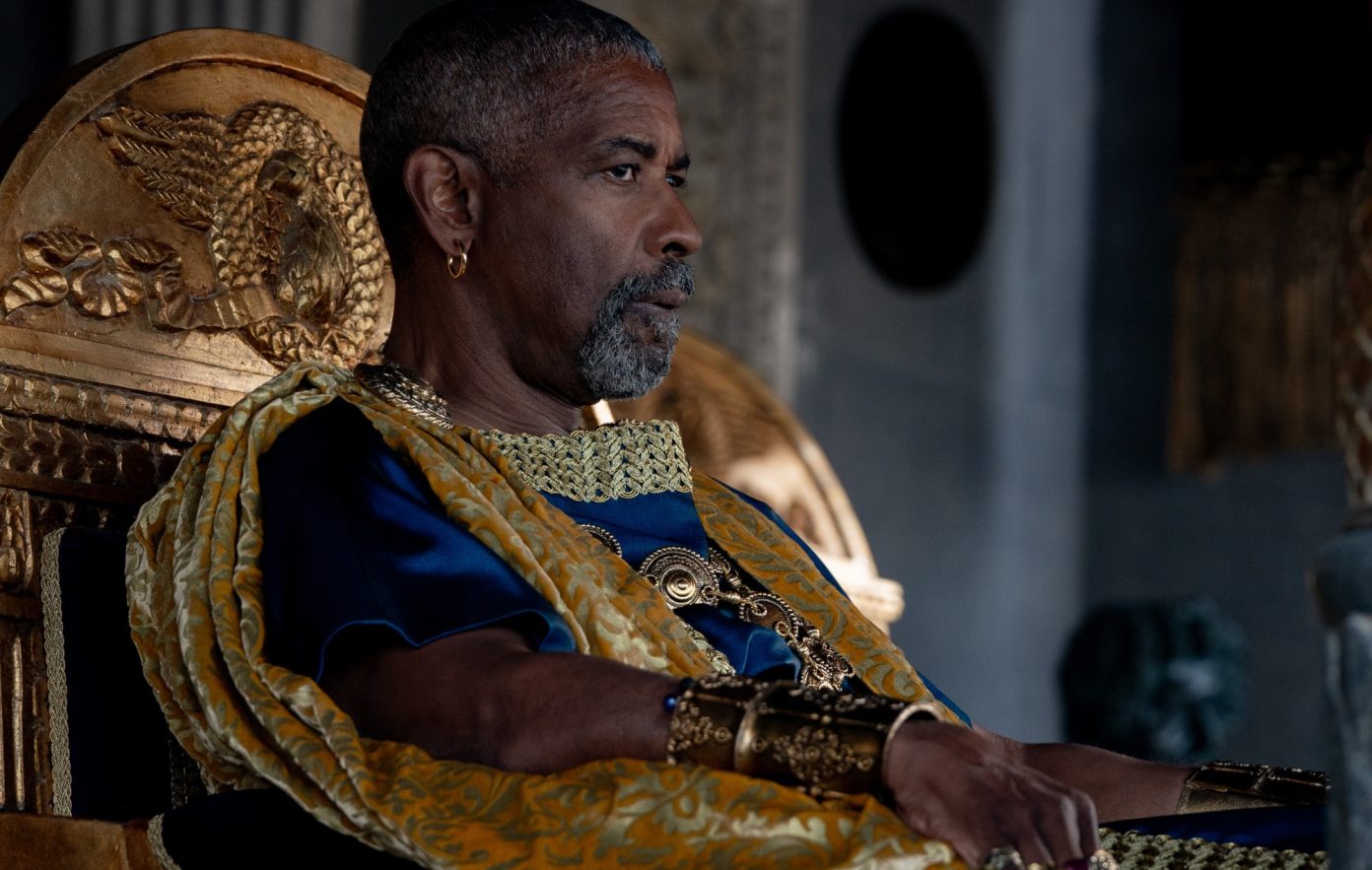- Film And TV
- 29 Dec 24

As part of our 12 Interviews of Xmas series, we're looking back at some of our most unforgettable interviews of 2024. As Gladiator II landed in cinemas in November, Paul Mescal spoke to us about his lead role in the blockbuster – and lots more besides....
Originally published in Hot Press in November 2024:
Paul Mescal is on a roll. The darling of prestige television and independent drama for his beautifully subtle and emotionally intelligent performances in Normal People, Aftersun, Foe and All Of Us Strangers, the Irish actor is upending expectations – and ascending to a different level of stardom – with Ridley Scott’s Gladiator II.
He plays the lead role of Lucius, a bereaved and rage-filled gladiator, seeking vengeance for the murder of his wife – and for the rampant bloodshed inflicted by the Roman Empire. There's more involved here than playing a stoic fighting machine or starring in an epic action blockbuster that’s a new and bold move for the actor: he’s also stepping into an existing cinematic world where it is easy to flounder or fail.
Ridley Scott’s historical epic original, released in 2000, bravely revitalised a beloved cinematic genre – and the sword-and-sandals crowd-pleaser, which made more than $465 million worldwide, duly won five Academy Awards and catapulted Russell Crowe to international stardom.
Two decades later, Gladiator II once again pits a heroic warrior against the might of the Roman Empire in the name of strength and honour – though the might of the Roman Empire has never been quite so large in scale, or diverse in species. From dramatic naval battles to fending off charging rhinos; and chomping baboons to a shark infestation in the Colosseum, the challenges facing Lucius are outrageous and often thrilling – and the pressure to not only do the original justice but to expand upon Ridley Scott’s universe was keenly felt by Mescal.
Advertisement
“Ridley Scott’s a king in cinema and especially this genre,” the actor says. “When Ridley comes knocking, you just say yes. It’s definitely been a career highlight for me to watch the way the master’s brain works. And he was incredibly generous about sharing his knowledge and talent with me.”
Mescal is aware of the influence of the original on modern cinema. “It holds a huge amount of weight for a vast number of people across the world,” he says. "And the scale of it is huge. It’s not like any other role I’ve played. Going from independent features to a blockbuster studio picture was intimidating until I realised that acting is acting is acting, regardless of the context.”
Mescal is speaking to me from a room overlooking Croke Park stadium – “Dublin’s Colosseum!” the press reps tell me. He has spoken before about often feeling fear and anxiety when he takes on a role, and though the fear was present with Gladiator II, he’s getting better at harnessing it.
“Fear can be very motivating,” he tells me. “It probably sits somewhere between fear and anxiety. Like ‘fear’ may be too strong, but this feeling of like wanting to service the character is important: it causes a little anxiety or an energy as you’re trying to get into it.”
Some other actors say that every character they play is a version of themselves, which isn’t an acting philosophy Paul subscribes to, wanting to portray characters who are very different to him.
“I don't go to the school of acting where you fundamentally bring yourself to characters. I don't find that interesting from a personal standpoint because I think that you get that for free – you can't turn off that part of your psychology. My acting coach always says that you should never be pulling a character down to fit, you should always reach up to meet them.
"I like that kind of approach, so it's always just trying to figure out who the other person is. And sometimes there's certain similarities, that kind of crossover and that's like a gift. I think it's about holding on to a kind of curiosity and trying to feel like you're a bit of a detective, trying to figure out how these people operate. But I don't have a fixed set of rules that I go to with every character. You’re kind of fumbling around in the dark and trying to find things that make sense.”
Advertisement
 Paul Mescal in Gladiator II. Credit: Paramount
Paul Mescal in Gladiator II. Credit: ParamountTHE DAY YOU STOP IMPROVING
For the role of Lucius, the entry point into the character Paul Mescal found was Lucius' rage – the rage he variously feels over the death of his wife; over his childhood abandonment; and against the maniacal violence of the Roman Empire.
“The symptom that kept coming up was this rage and this anger,” he recalls. "So then I was like, well, what's the rage? It's a symptom of how he's been treated – rage and hurt, I think, are very closely linked. So I was trying to figure out what it was that caused him to be so angry and vindictive.”
Mescal is not known to be an angry presence onscreen – while Connell in Normal People and Junior in Foe had some outbursts, Mescal’s roles so far have been defined by a connection to others. On-screen, he’s often had the anchor of another character – and another actor – to react to and centre his emotion on. Being a solitary character whose rage is bubbling from inside was a different challenge for the actor, requiring him to garner the emotional energy of the character without input from the script.
“That’s exactly right,” he says. "That’s the main difference between this and any other role I’ve played. He doesn’t have anyone else to reach out to. He doesn't have like a Sophie or Marianne or anything like that. He’s been shut off: his avenue for comfort doesn't exist anymore. So it's all kind of self-fulfilled, positively and negatively. There are still moments, like Denzel's and my character trying to play each other, often, in a kind of weird chess game – but emotionally it's all kind of suppressed.”
Advertisement
 Paul Mescal and Pedro Pascal in Gladiator II. Credit: Paramount
Paul Mescal and Pedro Pascal in Gladiator II. Credit: ParamountLucius is a remarkably physical role. Mescal not only had to undergo strength training to build up the muscle required for the character, but he also learned how to handle a sword like a gladiator. Undergoing such a radical physical transformation – and playing such a stoic character who survives by fighting – meant that Mescal had to approach his character’s physicality differently.
“Initially when I was cast, I'm was like ‘I’m not gonna go down that avenue of making myself big and buff - which was very naïve!” he laughs. “It started to make less and less sense. The closer it got to like say, six, seven months out, I was like, ‘Well, it would make no sense that this person would survive if he wasn't strong enough to withstand or inflict damage’ – which is a weird thing to admit, that that was the requirement.
“Then, when you start training with that in mind, even though it's a totally imaginative experience, you're imagining what it would require to hurt people, which is a weird thing to do, but it does change the way that you operate physically. It's the fun part of acting that you get to have these imagined experiences that you don’t necessarily have to feel guilty about or complicated about because you’re doing a job.”
Mescal enjoyed the training. “I love when there’s something to prep every day,” he observes. "In this instance it was gym training, because sometimes you don't have a skill or a physical requirement that requires your attention every day. So something like that is like an anxious person's dream!”
Mescal shares a lot of screen time with Denzel Washington, who plays Macrinus, a Roman businessman who has amassed enormous wealth thanks to his acumen and brutal ambition, and who becomes a self-interested mentor to Lucius. The 28 year old actor also has several scenes with Pedro Pascal who plays General Acacius, a Roman general who becomes the target of Lucius' wrath – though the two characters may have more in common than they think.
Mescal expresses huge admiration for his co-stars. He admitted on Graham Norton that he was so intimidated by Denzel Washington that the first day he wanted to introduce himself, he chickened out and waited for Washington to approach him.
Advertisement
I ask him about working with older, more established actors.
“I think the minute you stop being curious about how other actors work is probably the day that you stop improving,” muses Mescal. “But I do feel confident in how I like to be on set. I'm always looking to learn watching someone like Denzel: I’d see him do something and think ‘That’s genius!’ But there's other stuff that I'd think, ‘I can see how that works for him, but it just wouldn't work for me.’ But I think the important part is that your eyes and ears are open to how other people are working.”
 Denzel Washington in Gladiator II. Credit: Paramount
Denzel Washington in Gladiator II. Credit: ParamountA FALSE SENSE OF SECURITY
Mescal didn’t ask Washington for advice, and waited until the end of filming to gush, saying that gushing and fanboying out can lead to a very uncreative environment.
“At the end of filming with Denzel, I was like, ‘I'm absolutely blown away with the fact that I got to work with you’ – and he laughed,” Paul explains. “I said ‘Oh man, I didn't even know if you liked me!’”
Advertisement
Mescal laughs incredulously, shaking his head. “I was like ‘Oh my god.’ But I think it's a testament to the fact that he just comes ready to work. He doesn't care about anything else, which I found just so liberating. If someone like, Denzel, like Ridley, like Pedro – if anyone's going to be bored, it’s them because they've seen it all, they've done it all, but there's such appetite to do the job that they do, but also to improve. That’s inspiring.”
Paul Mescal is already considered one of the greatest actors of his age – but Gladiator II is about to shoot him to a new level of stardom. It’s clear he feels incredibly grateful to have had these opportunities and is proud of the Irish stars around him like Cillian Murphy, Saoirse Ronan, Andrew Scott, and Barry Keoghan, who are similarly receiving international acclaim.
He is aware of how Ireland relishes the success of these actors and says it supports the arts generally. But real life is more complicated. The actor is acutely aware of the challenging circumstances facing young Irish creatives today. He reckons that many people are finding in impossible to fund a career in the arts.
“There's two sides to that,” says Mescal. “Like, there's a side that, I got to act, I got to train in a bachelor arts degree for €9,000. I couldn't do that in London or in the US. But having said that, the problem isn’t in the education system. The problem is that people can’t afford to live in Dublin.
"It would be very easy for people in government to look at the Irish actors that are successful – but it's not necessarily relevant to the infrastructure that they’re putting in place. Having said that, there's an amazing opportunity to go to college for that amount. I couldn't have done that. But you see arts cutbacks every single year when people are trying to finance plays and stuff, there's no place for that. So in time, you'll see talent just dry up because there's no avenue for them to go and pursue the arts.
"I don't necessarily know the answer, but I think it’s really important not to be lulled into a false sense of security about it.”










